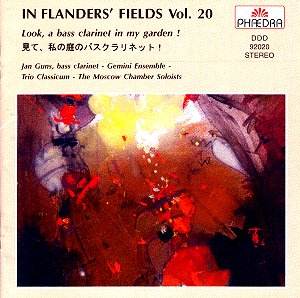Dirk Brossé is a gifted, versatile and prolific
composer who has made quite a reputation with some fine film scores
(his score for the Award-nominated Daens is one of his finest
so far). His music, though clearly belonging to the 20th
Century mainstream, is richly melodic, beautifully crafted and quite
appealing. His Elegy for bass clarinet and string quartet,
arranged from the original for bass clarinet and piano dating from 1999,
is a moving miniature thoroughly characteristic of Brossé’s generous
music making.
Johan Favoreel, a recording producer working with the
Flemish Radio and Television, was trained at the Royal Conservatoire
in Brussels. His short bass clarinet quintet Zebus, dedicated
to Jan Guns as are Brossé’s Elegy and most other
pieces in this collection, portrays the Greek god who "spent his
time eating, drinking and lulling lazily in the sunshine". A delightful
miniature with more than a hint of irony.
Some time ago I
reviewed a disc published by the Royal Flemish Conservatory (Willem
Kersters Composition Class 2002) in which Alain Craens’ beautiful
double concerto November Music was included. Here are
two other pieces of his. The Divertimento for clarinet,
bass clarinet and basset horn, completed in 1985, is a lovely entertaining
work in three short, contrasted movements. The somewhat more recent
Experience is another attractive short piece for bass
clarinet, string quartet and percussion (bells, vibraphone, marimba).
Do not be put off by the title, for there is absolutely nothing experimental
in this appealing piece.
Westerlinck’s Pierrot, subtitled Divertimento
coreografico in omaggio ad Albert Giraud, naturally alludes, albeit
obliquely, to Schönberg’s Pierrot Lunaire composed
on texts by Giraud in German translation. Seven short, neatly characterised
movements in this attractive, also mildly ironic trio for clarinet,
bass clarinet and basset horn. (Just listen to the short tongue-in-cheek
quotation from The Nutcracker in the opening March and its restatement
at the end of the piece.) This lovely work depicts Pierrot’s various
moods as suggested in Giraud’s poems.
York Bowen’s Fantasy Quintet Op.93 is
the most substantial work here. By the way, this is its first recording
(Sorry, my friends in the British Music Society but we did it first!)
and another recording followed some time later (in an all-Bowen programme
on BMS
426 CD). This is quintessential Bowen: long flowing tunes, warmly
Romantic harmonies with hints of Impressionism and – above all – superbly
written. A minor masterpiece.
Yuyama’s Divertimento, a rondo in variation
form, was originally written for alto saxophone and marimba, but may
be played as it is here. It is a fine piece, though marginally a bit
too long for its material, well worth having anyway as is Camilleri’s
Duo-Sonata written for Jan Guns and Rita Rommes. It is
based on material originally sketched for a work for cello and piano.
It is in three concise movements of fairly equal length, of which the
last one is some sort of "notated improvisation".
All in all, this is a varied and well played selection
of works for a still rather unusual instrument that has nevertheless
caught composers’ attention over the years thanks to the tireless championing
of some gifted players such as Harry Sparnaay and Jan Guns. A bit too
closely recorded at times, but never unbearably so; and there is really
much to enjoy here.
Hubert Culot
NOTE
Information concerning PHAEDRA CDs may be obtained
from the following address
Vzw Klassieke Concerten – Phaedra CD
Donkerstraat 51
B-9120 BEVEREN
Belgium
Or by browsing through their website www.phaedracd.com
